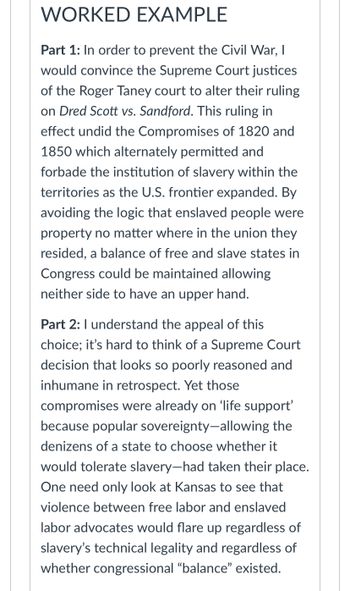Question
. In three to four sentences, identify your selection and why you think altering this particular event will make the Civil War less likely.](https://content.bartleby.com/qna-images/question/30974276-18f0-42d8-abf7-ace8a96c26f7/9c4fbe91-45fc-497c-b6ec-369d68986e3a/cqtfebo_thumbnail.jpeg)
Transcribed Image Text:**Part 1:** Historians often wrestle with the question of whether a particular event was “inevitable” or if a different outcome was possible. Few events generate this kind of “counterfactual” or “what if…” thinking more than the buildup to the Civil War.
- **Prompt:** Imagine for a moment that you are a time traveler sent on a mission to prevent the Civil War from taking place. You can intercede in one event from the 1850s found in this [timeline](#). In three to four sentences, identify your selection and why you think altering this particular event will make the Civil War less likely.

Transcribed Image Text:**Worked Example**
**Part 1:** In order to prevent the Civil War, I would convince the Supreme Court justices of the Roger Taney court to alter their ruling on *Dred Scott vs. Sandford*. This ruling in effect undid the Compromises of 1820 and 1850 which alternately permitted and forbade the institution of slavery within the territories as the U.S. frontier expanded. By avoiding the logic that enslaved people were property no matter where in the union they resided, a balance of free and slave states in Congress could be maintained allowing neither side to have an upper hand.
**Part 2:** I understand the appeal of this choice; it’s hard to think of a Supreme Court decision that looks so poorly reasoned and inhumane in retrospect. Yet those compromises were already on ‘life support’ because popular sovereignty—allowing the denizens of a state to choose whether it would tolerate slavery—had taken their place. One need only look at Kansas to see that violence between free labor and enslaved labor advocates would flare up regardless of slavery’s technical legality and regardless of whether congressional “balance” existed.
Expert Solution
This question has been solved!
Explore an expertly crafted, step-by-step solution for a thorough understanding of key concepts.
This is a popular solution
Trending nowThis is a popular solution!
Step by stepSolved in 2 steps
